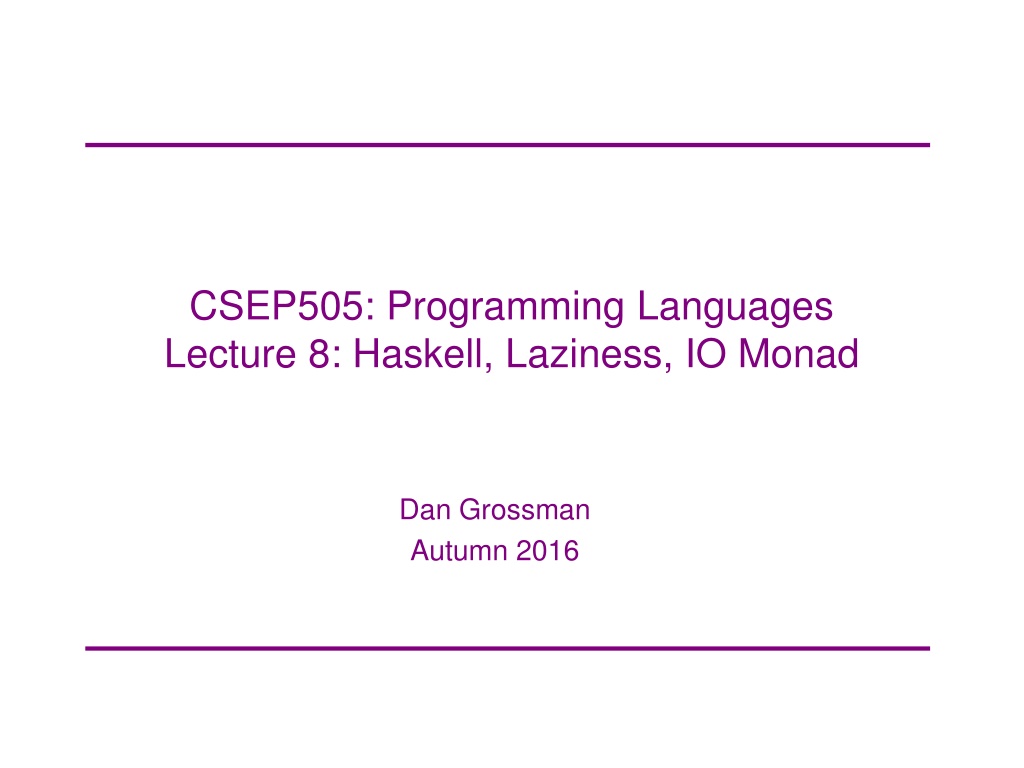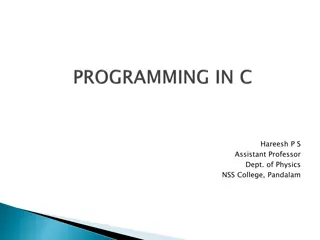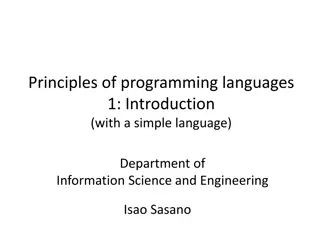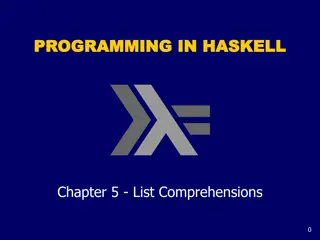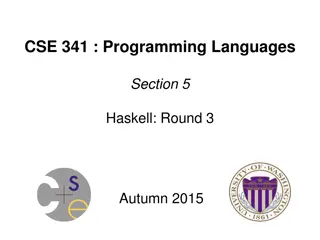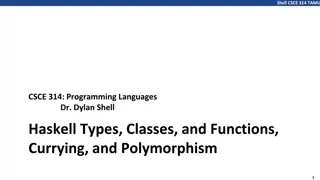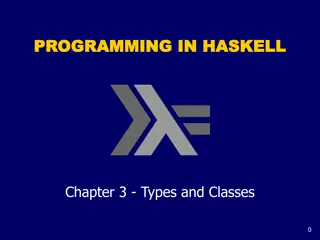Exploring Haskell Programming Language
Haskell is a functional programming language, similar to ML but with unique features like lazy evaluation and monadic IO. It was designed in the 1980s and 1990s to unify lazy languages research efforts and continues to evolve. This lecture covers the history, features, and applications of Haskell, emphasizing its differences from other languages and why it's used for certain assignments.
Download Presentation

Please find below an Image/Link to download the presentation.
The content on the website is provided AS IS for your information and personal use only. It may not be sold, licensed, or shared on other websites without obtaining consent from the author. Download presentation by click this link. If you encounter any issues during the download, it is possible that the publisher has removed the file from their server.
E N D
Presentation Transcript
CSEP505: Programming Languages Lecture 8: Haskell, Laziness, IO Monad Dan Grossman Autumn 2016
Acknowledgments Slide-and-code content liberally appropriated with permission from Kathleen Fisher, Tufts University She in turn acknowledges Simon Peyton Jones, Microsoft Research, Cambridge for many of these slides And then I probably introduced errors and weaknesses as I changed them Lecture 8 CSE P505 Autumn 2016 Dan Grossman 2
References Real World Haskell , Particularly Chapters 0 & 7 http://book.realworldhaskell.org/ Tackling the Awkward Squad Particularly Sections 1 & 2 http://research.microsoft.com/~simonpj/papers/marktoberdor f/mark.pdf Lecture 8 CSE P505 Autumn 2016 Dan Grossman 3
Haskell Haskell is a programming language that is: Similar to ML: general-purpose, strongly typed, higher-order, functional, supports type inference, Different from ML: purely functional core, lazy evaluation, monadic IO, type classes, These differences are why we will use it for Homework 5 and what we will focus on Designed by committee in 1980s and 1990s to unify research efforts in lazy languages. Continues to evolve. Haskell 1.0 in 1990, Haskell 98, Haskell ongoing. A History of Haskell: Being Lazy with Class HOPL 3 Lecture 8 CSE P505 Autumn 2016 Dan Grossman 4
These graphs arent mine and arent based on real data, but they re fun [and make a meta-point ?] Lecture 8 CSE P505 Autumn 2016 Dan Grossman 5
Successful Research Languages Practitioners 1,000,000 10,000 100 The slow death Geeks 1 1yr 5yr 10yr 15yr
Committee languages Practitioners 1,000,000 10,000 100 The even slower death Geeks 1 1yr 5yr 10yr 15yr
C++, Java, Perl, Ruby Threshold of immortality Practitioners 1,000,000 10,000 The complete absence of death 100 Geeks 1 1yr 5yr 10yr 15yr
Haskell 1,000,000 Practitioners 10,000 100 The second life? Geeks 1 1990 1995 2000 2005 2010
Function types mean more Thanks to purity, a function type is a stronger spec in Haskell: If f :: A -> B, then for every e :: A, we know f e Equals some v :: B, or Does not terminate [hand-wave exceptions, ] If e1 = e2, then f e1 = f e2 A bigger deal than it looks no side effects or implicit state let x = f e in (x,x) is indistinguishable from (f e, f e) Lecture 8 CSE P505 Autumn 2016 Dan Grossman 10
Ah, xkcd http://xkcd.com/1312/ Lecture 8 CSE P505 Autumn 2016 Dan Grossman 11
Syntax differences from OCaml x :: Int means x has type Int y : ysmeans cons y onto list ys \x -> x + 1 \ means lambda Required upper/lowercase: Expression identifiers are lowercase Type constructors (names) are uppercase Type variables are lower case (and no ) Comments: -- to end of line {- -} At top-level no let for bindings In other scopes, let or where with latter common Whitespace relevant (no | on case branches, ) Lecture 8 CSE P505 Autumn 2016 Dan Grossman 12
List comprehensions Not a big deal but convenient syntax for maps, filters, and zips Could desugar myData = [1,2,3,4,5,6,7] twiceData = [2 * x | x <- myData] -- [2,4,6,8,10,12,14] twiceEvenData = [2 * x| x <- myData, x `mod` 2 == 0] -- [4,8,12] crossProductDataEvens = [(i,j)| i <- myData, j <- myData, (i+j) `mod` 2 == 0] -- [(1,1),(1,3),(1,5),(1,7),(2,2),(2,4), ] Lecture 8 CSE P505 Autumn 2016 Dan Grossman 13
Laziness Haskell is a lazy language Functions (and data constructors) do not evaluate their arguments until they need them Then store the result to avoid re-execution By default this happens everywhere Theoretical best approach in pure language Humans struggle to determine when evaluation happens But thanks to purity it doesn t matter (!) And laziness is powerful for infinite data structures Lecture 8 CSE P505 Autumn 2016 Dan Grossman 14
If OCaml vs. Haskell if :: Bool -> a -> a -> a if b e1 e2 = case b of True -> e1 | False -> e2 (* WRONG: always evaluates e1 and e2 *) let if b e1 e2 = match b with true -> e1 (* RIGHT but no memoization (fine here) and caller must thunk *) let if b e1 e2 = match b with true -> e1 () (* using Lazy library (but avoiding special syntax) and caller must thunk and use Lazy.from_fun *) let if b e1 e2 = match b with true -> Lazy.force e1 | false -> Lazy.force e2 | false -> e2 | false -> e2 () Lecture 8 CSE P505 Autumn 2016 Dan Grossman 15
Implmenting OCaml lazy Lazy module no big deal: type a t1 = Done of a | NotDone of unit -> a type a t = a t1 ref (* export abstractly *) let from_fun f = ref (NotDone f) let force p = match !p with Done v -> v NotDone f -> p := Done (f()); force p The point is this is the semantics in Haskell for every function call and data argument (forced only when its known that result of program needs it) Lecture 8 CSE P505 Autumn 2016 Dan Grossman 16
Examples loop x = loop x xs = 3+2 : loop 7 : 1+4 : [] x1 = head xs x2 = (head (tail xs)) x3 = (head (tail (tail xs))) three = length xs prefix_sums acc ys = case ys of [] -> [] y : ys -> (acc+y) : prefix_sums (acc+y) ys five = head (prefix_sums 0 xs) main :: IO a print x1; print x3; print three; print five -- ; print x2 Lecture 8 CSE P505 Autumn 2016 Dan Grossman 17
Lazy programming Do not worry about creating (thunks that create) large, even infinite data structures Then use only what you need Example: streams ones = 1 : ones nats = prefix_sums 0 ones a_few = tail (take 7 nats) Example: search problems [not shown] Natural separation between generator of [potentially- infinite] moves and consumer (search strategy) Lecture 8 CSE P505 Autumn 2016 Dan Grossman 18
Back to purity Pure functions are easy to test no side effects Example: If xs = reverse(reverse xs), then you can replace one with the other with high confidence And testing this property cannot depend on any state because if reverseis pure (and everything in core Haskell is pure), then it cannot depend on that state Lecture 8 CSE P505 Autumn 2016 Dan Grossman 19
Purity is beautiful Like in OCaml: higher-order functions, algebraic data types, parametric polymorphism, ... Plus equational reasoning due to no side effects and only needed computations evaluated If x = y, then f x = f y Order of evaluation is irrelevant, so don t have to think about it being lazy except for termination/performance Lecture 8 CSE P505 Autumn 2016 Dan Grossman 20
and the beast But to be useful as well as beautiful, a language must manage the Awkward Squad : Input/Output Imperative update Error recovery (e.g., timing out, catching divide by zero, etc.) Foreign-language interfaces Concurrency The whole point of a running a program is to affect the real world, an update in place of something Lecture 8 CSE P505 Autumn 2016 Dan Grossman 21
Direct approach Could allow side effects the usual way and discourage them Example: putchar :: Char -> () And similar for references, exceptions, ffi, concurrency In practice, this works fine in an eager language (cf. OCaml) but is unworkable in a lazy language Makes evaluation order relevant again And laziness is hard to reason about And compiler wants freedom to optimize away laziness when it can tell it won t matter This also doesn t work at the semantics level if we define our language to have undefined evaluation order rather than lazy As Haskell does Lecture 8 CSE P505 Autumn 2016 Dan Grossman 22
Examples Evaluation order of function arguments and data constructor arguments does not matter (and isn t defined) when functions are pure. Example: ((\x y. y) (putchar w ) [putchar x , putchar y ] With lazy implementation output still depends on how result is used By the way: What about exceptions? Non-deterministic evaluation order so any exception might happen works okay in practice Example: y = [3 `div` 0, head (tail [4])] Lecture 8 CSE P505 Autumn 2016 Dan Grossman 23
Tackling the Awkward Squad Laziness and side effects are incompatible Side effects are important! For a long time, this tension was embarrassing to the lazy functional programming community [will skip earlier solutions that worked okay for I/O in terms of lazy streams ] In early 90 s, a surprising solution the monad -- emerged from an unlikely source (category theory) Haskell s IO monad provides a way of tackling the awkward squad: I/O, imperative state, exceptions, foreign functions, & concurrency. Lecture 8 CSE P505 Autumn 2016 Dan Grossman 24
Monadic I/O: The Key Idea IO is a type constructor IO t is a type where t is a type Think of IO tas describing an action or computation that when performed produces a result of type t Now manipulate values of type IO t in your pure lazy language Pass them around, combine them, etc. With helpful functions and sugar But cannot do an IO action inside a program Only main :: IO a, can be performed By running the program Lecture 8 CSE P505 Autumn 2016 Dan Grossman 25
A helpful picture IO is an abstract type constructor, but think of it as: type IO t = World -> (t, World) An action that, when performed, takes a world and returns a t and a [new] world result :: t IO t Thanks to abstraction, there is no way to get a world , so you can t store or copy a world (woah!!) Lecture 8 CSE P505 Autumn 2016 Dan Grossman 26
Actions are first class Evaluating an IO t produces an action Evaluation has no side effects Does not perform-the-action, which [probably] has side effects Lecture 8 CSE P505 Autumn 2016 Dan Grossman 27
Simple I/O () Char Char getChar putChar getChar :: IO Char putChar :: Char -> IO () Main program is an action of type IO () (and it is performed) main :: IO () main = putChar x Lecture 8 CSE P505 Autumn 2016 Dan Grossman 28
Connection actions To read a character and then write it back out, we need to connect two actions () Char getChar putChar This is done with the bind combinator Lecture 8 CSE P505 Autumn 2016 Dan Grossman 29
Bind Provided (as are getChar and putChar are) (>>=) :: IO a -> (a -> IO b) -> IO b Semantics is exactly the compound sequenced action you would expect from the type () Char getChar putChar echo :: IO () echo = getChar >>= putChar Lecture 8 CSE P505 Autumn 2016 Dan Grossman 30
More on >>= Called bind because it binds the result of the left-hand action in the action on the right The result of calling >>= is an action that, when performed: Performs the action on the left, producing result r1 Applies the function on the right to r1 to get another action Applies that action, to get another result r2 Returns r2 e1 >>= \x -> e2 r2 r1 x e1 e2 Lecture 8 CSE P505 Autumn 2016 Dan Grossman 31
Printing a character twice echoDup :: IO () echoDup = getChar >>= (\c -> putChar c >>= (\() -> putChar c)) Parentheses are optional for usual lambda-concrete-syntax reasons Do notation is syntactic sugar for exactly the same thing Designed to look imperative ; will extend it soon It s just sugar for creating actions with bind, not performing them! echoDup :: IO () echo = do { c <- getChar; () <- putChar c; putChar c; } Lecture 8 CSE P505 Autumn 2016 Dan Grossman 32
More sugar / helper functions The then combinator sequences actions when there is no value to pass forward (>>) :: IO a -> IO b -> IO b m >> n = m >>= (\_ -> n) echoDup :: IO () echoDup = getChar >>= (\c -> putChar c >> putChar c) echoDup :: IO () echoDup = do { c <- getChar; putChar c; putChar c; } Lecture 8 CSE P505 Autumn 2016 Dan Grossman 33
Getting Two Characters getTwoChars :: IO (Char,Char) getTwoChars = getChar >>= (\c1 -> getChar >>= (\c2 -> ???? (c1,c2) :: (Char, Char) but we need the ???? to be replaced with something of type IO (Char, Char) Need a way to convert plain values into IO actions Should be fine: performing the action in a world is just evaluate the expression [ignoring the world] Lecture 8 CSE P505 Autumn 2016 Dan Grossman 34
The return combinator [I won t try to justify the name return it s not what you think even though it sorta kinda sounds right] The action return v just produces result v (no side effects) return :: a -> IO a return getTwoChars :: IO (Char,Char) getTwoChars = getChar >>= (\c1 -> getChar >>= (\c2 -> return (c1,c2) Lecture 8 35 CSE P505 Autumn 2016 Dan Grossman
Yet more sugar Can omit braces for do-notation Can use indentation instead of semicolons some more But the simple stuff is just : x <- e1; e2 for e1 >>= \x. e2 e1; e2 for e1 >> e2 return e[not necessarily just at end because it s not the return you are used to] Lecture 8 CSE P505 Autumn 2016 Dan Grossman 36
Bigger Example [Of course in practice, you would provide this as a faster primitive] Key points: Recursion as usual Mixing in regular code that produces actions getLine :: IO [Char] getLine = do { c <- getChar ; if c == '\n' then return [] else do { cs <- getLine; return (c:cs) }} Lecture 8 CSE P505 Autumn 2016 Dan Grossman 37
A helpful picture [again] IO is an abstract type constructor, but think of it as: type IO t = World -> (t, World) An action that, when performed, takes a world and returns a tand a [new] world result :: t IO t Thanks to abstraction, there is no way to get a world , so you can t store or copy a world (woah!!) Enforces single path through a sequence of actions Lecture 8 CSE P505 Autumn 2016 Dan Grossman 38
Control Structures More examples showing how first-class actions can be composed to build your own control structures Think: treating code [actions] as data and building up compound data that can later be run forever :: IO () -> IO () forever a = a >> forever a repeatN :: Int -> IO () -> IO () repeatN n a = if n=0 then return () else a >> repeatN (n-1) a Example use: repeatN 5 (putChar # ) Lecture 8 CSE P505 Autumn 2016 Dan Grossman 39
More first-class fun Showing general idea of first-class actions lets the programmer define structures of [arbitrary] actions No need to bake more than >>= and return into the language sequence :: [IO a] -> IO [a] sequence xs = case xs of [] -> return [] y:ys= do { r <- y; rs <- sequence ys; return (r:rs) } Example use: sequence [getLine, putChar > >> return [], getLine] Lecture 8 CSE P505 Autumn 2016 Dan Grossman 40
Growing the IO monad The IO monad is built-in to Haskell via main :: IO() It is one-stop shopping for all the stuff that needs a well- defined sequence when performed a.k.a. the sin bin combined with the outside world Just a flavor: openFile :: FilePath -> IOMode -> IO Handle hPutStr :: Handle -> String -> IO () hGetLine :: Handle -> IO String hClose :: Handle -> IO () data IORef a -- Abstract type newIORef :: a -> IO (IORef a) readIORef :: IORef a -> IO a writeIORef :: IORef a -> a -> IO () Lecture 8 CSE P505 Autumn 2016 Dan Grossman 41
So we have an imperative language So now you could write this count :: (a -> Bool) -> [a] -> IO Int count f xs = do { r <- newIORef 0; help r xs } where help r xs = case xs of [] -> readIORef r | x:xs -> if f x then do { old <- readIORef r; else help r xs writeIORef r (old+1); help r xs } Lecture 8 CSE P505 Autumn 2016 Dan Grossman 42
But Just because you can write imperative code doesn t mean you should count :: (a -> Bool) -> [a] -> Int count f xs = case xs of [] -> 0 | x:xs -> (if f x then 1 else 0) -- previous slide s count -- :: (a -> Bool) -> [a] -> IO Int -- can get an IO Int with -- return (count f xs) + count f xs Lecture 8 CSE P505 Autumn 2016 Dan Grossman 43
The Roach Motel Once you get in to the IO monad, you can t get out Bind lets you use a value in there but leaves you in there Return gets anything you want in there So you find yourself wanting to cheat , looking for a magic_escape :: IO a -> a The presence of such a function would break everything because it would have to perform the action [no other way it could find an a, but then we have side effects in allegedly pure code, which was the whole thing we were trying to avoid] Lecture 8 CSE P505 Autumn 2016 Dan Grossman 44
Examples with this problem Suppose you want to read some configuration options from a file but treat the values as pure constants configFileContents :: [String] configFileContents = lines (readFile "config") --NO! useOptimization :: Bool useOptimization = elem "optimize" configFileContents This doesn t and shouldn t type-check: readFile :: String->IO String Leaves only two options: Put all code depending on file contents in IO monad Cheat Lecture 8 CSE P505 Autumn 2016 Dan Grossman 45
The Cheat Exists (!) They call it unsafePerformIO not magic_escape magic_escape :: IO a -> a Any code that uses it has an obligation to know that it doesn t matter When we perform the IO action How many times we perform the IO action Relative order of performing this action vs. other actions [Notice: Reading a read-only, accessible file meets this obligation] The operator has a deliberately long to discourage its use Lecture 8 CSE P505 Autumn 2016 Dan Grossman 46
BTW, It really is a cheat You can use unsafePerformIO to circumvent the type system arbitrarily Exact same issue arises in OCaml without the value restriction OCaml has to avoid this; Haskell can say unsafePerformIO is unsafe r :: forall a. IORef a -- This is bad! r = unsafePerformIO (newIORef (error "urk")) cast :: b -> c cast x = unsafePerformIO (do {writeIORef r x; readIORef r }) Lecture 8 CSE P505 Autumn 2016 Dan Grossman 47
Implementation The compiler front-end and optimizer doesn t know that the IO monad is special It can be restrained by using an unkown World type that is threaded through Then the back-end code generator can convert the World -y code to in-place imperative operations type IO t = World -> (t, World) -- in compiler front return :: a -> IO a return a = \w -> (a,w) (>>=) :: IO a -> (a -> IO b) -> IO b (>>=) m k = \w -> case m w of (r,w ) -> k r w Lecture 8 CSE P505 Autumn 2016 Dan Grossman 48
Summary A Haskell program is a single IO action called main. Inside the IO monad, evaluation order is defined Big IO actions are built by gluing together smaller ones with bind (>>=) and by converting pure code into actions with return IO actions are first-class They can be passed to functions, returned from functions, and stored in data structures So it is easy to define new glue combinators The IO Monad allows Haskell to be pure while efficiently supporting side effects The type system separates the pure from the effectful code Lecture 8 CSE P505 Autumn 2016 Dan Grossman 49
A Monadic Outer Layer In languages like ML or Java, the fact that the language is in the IO monad is baked into the language There is no need to mark anything in the type system because it is everywhere. In Haskell, the programmer can choose when to live in the IO monad and when to live in the realm of pure functional programming So it is not Haskell that lacks imperative features, but rather the other languages that lack the ability to have a statically distinguishable pure subset Lecture 8 CSE P505 Autumn 2016 Dan Grossman 50
